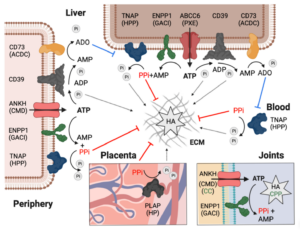The Ectopic Calcification Laboratory focuses on understanding the complex molecular mechanisms of soft-tissue mineralization. Ectopic calcification is prevalent in rare hereditary disorders, and frequently detected in common multifactorial diseases, leading to significant morbidity and mortality worldwide. Currently there is no effective treatment for this often-life-threatening condition.
Research focus
The Ectopic Calcification Laboratory aims to:
- unravel physiological processes leading to or inhibiting the calcification of soft tissues
- seek therapeutic approaches to prevent, alleviate, or resolve ectopic mineralization
- develop analytic modalities to provide suitable biomarkers to monitor the efficacy of emerging therapeutic interventions

Recent findings
We have recently discovered that the level of inorganic pyrophosphate (PPi), an inhibitor of ectopic calcification, is significantly reduced in blood plasma of healthy pregnant women. In line with this, in a cohort of women with the rare ectopic mineralization disease Pseudoxanthoma elasticum (PXE), characterized by intrinsically low pyrophosphate levels, we have shown that multiparous PXE patients (giving birth ≥3 times) have higher levels of vascular calcification compared to patients with less/no childbirths. Based on these findings and independent epidemiological studies, we have concluded that recurrent gestational pyrophosphate shortage may determine the later-in-life cardiovascular disease risk of healthy multiparous women.
In addition, we were the first to identify incomplete penetrant ABCC6 variants in a large European cohort of PXE patients recently. Our genetic study combined with in-vitro analysis of these variants hints for a putative interaction partner of ABCC6, a question we set out to investigate in details.
Methodology
In addition to studies conducted on patient cohorts the Ectopic Calcification Laboratory utilizes a wide array of methods: biochemical assays, molecular biology tools, cellular, ex-vivo and animal models.
Funding
- ELKH-POC-2022 Proof-of-Concept grant
- National Research, Development and Innovation Office, Hungary; OTKA FK-131946; OTKA K-132695
- FWO Junior Fundamental Research Project G061521N, FWO Research Foundation Flanders, Belgium
- INTEC-International Network on Ectopic Calcification; Ghent University, Belgium
- UNKP-Bolyai+ New National Excellence Program, Ministry for Innovation and Technology from the source of the National Research, Development and Innovation Fund, Hungary
- Bolyai János Fellowship of Excellence (BO/00730/19/8), Hungarian Academy of Sciences, Hungary
Lab members
Flora Szeri, PhD, Principal Investigator
Martin Várhegyi, PhD student
Virgil Tamatey, PhD student
Fanni Tatai, MSc student
Dzsenifer Lukács, MSc student
Áron Nagy, MSc student
Zsófia Demjén-Nagy, BSc student
Fanni Fekete, BSc student
External homepage
https://floraszeri.wixsite.com/szerilab

